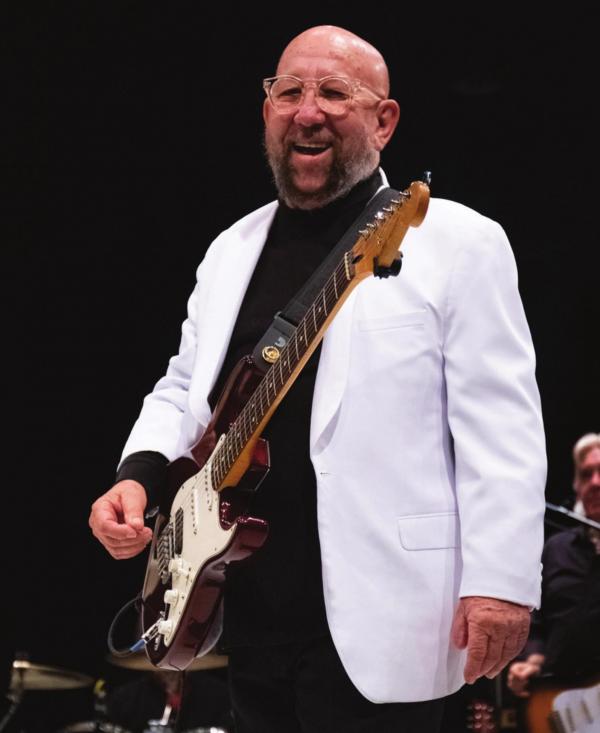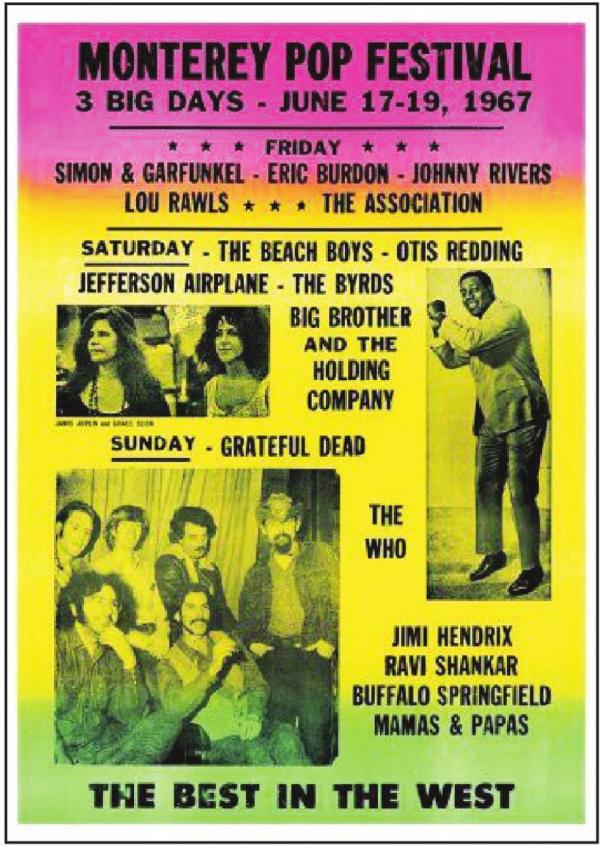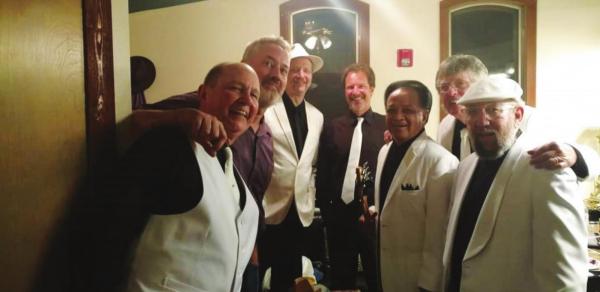Cherish the memories of founding THE ASSOCIATION
This is the first part of a two-part story on Jules Alexander, a longtime Wimberley resident and founding member of the musical group The Association.
When asked how many times he has sung the song “Cherish” Jules Alexander answers with a laugh: “Oh man, I don’t know. I couldn’t even get close. But it’s a lot.”
You have to figure it’s well up in the thousands.
You see, Jules is one of the founding members of the rock group The Association.
The same group that has, over the years, produced million-selling songs such as “Cherish,” “Windy” and “Never My Love.” The hit “Along Comes Mary” is not far behind.
For the last 33 years, Jules has called Wimberley and Woodcreek North his home.
That is, it’s his home when he’s not on the road. The Association has been performing for more than 50 years now and, in a typical year, might play 50 or 60 gigs. In 2021, there are some 51 concerts scheduled, although the virus will likely cause the cancellation of most — if not all — of those performances.
In its heyday, the band has played all over the world, from England to the Philippines. These days, the group plays venues ranging from the legendary stage at the Ryman Auditorium in Nashville to the showroom at the Golden Nugget Hotel and Casino in Las Vegas.
In 1967, The Association was the opening act at the Monterey Pop Festival that featured Jimi Hendrix, the Who, Janis Joplin, the Animals and introduced Otis Redding. There were also several appearances on the “Ed Sullivan Show” — a spot reserved for rock and roll’s elite.
Knows a lot of people
You mention a name from rock and roll’s past and Jules has a story to go with it.
At the Monterey festival, Jules had taken up sewing and designed some innovative trousers with velcro flaps instead of a zipper. Backstage, singer Janis Joplin admired his design — “cool pants” was her initial reaction — and they struck up a conversation. “She was so nice and easy to talk to,” Jules recalls. Joplin died a few years later of a heroin overdose.
Ricky Nelson was a “great guy” and Jules defended his song “Garden Party” when a well-known music critic found fault with it.
He remembers John Kay when he was a nightclub bouncer and used to ride his motorcycle into the club. That was before Kay started the band Steppenwolf (“Born to be Wild,” “Magic Carpet Ride”).
Jules figures, over the years, The Association played more gigs with The Mamas and The Papas (“California Dreaming’” and “Monday, Monday”) than any other group.
Over 50 years in the music business, you meet a lot of people.
Started in Hawaii
Jules was an optical technician in the Navy in the early 1960s at Pearl Harbor when he met Terry Kirkman. The two jammed together at a party and promised to meet up after Jules was discharged.
Kirkman lived in Southern California and when he left the service Jules headed for the West Coast. They started a band called The Inner Tubes that played at the famed Troubadour nightclub in West Hollywood. Band members drifted in and out, including Cass Elliot (The Mamas and The Papas) and David Crosby (The Byrds and Crosby, Stills & Nash).
The Inner Tubes broke up and the 13-member band called The Men was formed in its place. It had a folkrock style and, for a while, it was the house band at the Troubadour. The Men was one of the first folkrock groups to go electric. “It was a pretty good band,” remembers Jules, who was playing guitar at the time. “Everyone was good at what they did.”
The Men also disbanded and six of the members went out on their own. “We were trying to figure out a name,” says Jules. “Terry’s girlfriend came up with The Association and we said OK. That was it.”
They went through a series of band managers. One chipped in $10,000 which allowed the band to survive and rehearse every day for months. Another manager was an aspiring actor and brought some polish to the band’s style. Finally, a manager who was a former football player signed on. “He treated us like a sports club. It was about teamwork and discipline. It really helped,” says Jules.
In 1966, Jules heard a song he liked and talked the songwriter into letting The Association record it. “Along Comes Mary” rocketed to No. 7 on the charts and The Association took off with it. The song generated some controversy because Mary was slang for marijuana.
Prior to a performance at kid-friendly Disneyland in Anaheim, Calif., Jules recalls, a Disney employee demanded the band not perform “Along Comes Mary” — “that song about marijuana.” The Association’s manager vehemently argued the point. “They were nose to nose,” recalls Jules. “Then three nuns came up and said how much they enjoyed our song about Mother Mary.” The Disney official stopped in mid-sentence, turned on his heels and stalked off. The band played the song.
No. 1 hits
The hits just kept coming: “Cherish” — which was written by Kirkman — hit No. 1 on the charts and stayed there for three weeks; “Windy” was a No. 1 hit and listed as No. 4 song for 1967; “Never My Love” also topped the charts and has since been covered by dozens of individuals and groups, ranging from the surf group The Ventures to Mexican band Los Freddy’s.
The Association’s original “Never My Love” was the standard and led to appearances on TV shows hosted by Johnny Carson, Andy Williams, Dick Clark, Dean Martin, and many others.
In 1999, the music-tracking company BMI ranked “Never My Love” as the second most played song of the 20th Century, after No. 1 “You’ve Lost That Lovin’ Feelin’” and before No. 3 “Yesterday.”
The band contributed a number of songs to the soundtrack of the 1969 movie “Goodbye Columbus,” starring Richard Benjamin, Jack Klugman and Ali McGraw. “We submitted 10 songs for that movie,” says Jules. “They picked four or five. Mine lost.”
In the mid-70s, at the request of a friend, Jules wrote the music for the low-budget sci-fi movie “UFO: Target Earth” and recorded it in Ike Turner’s studio. “It was a terrible movie, but it was his first movie. Just Awful.” he says. “But the music got good reviews.”
The hits became fewer and fewer, but the band remained a popular concert attraction.
Members left, rejoined the group, then left again. Jules has kept track. There have been 47 members of The Association over the years. “You know, people would leave. Whatever. Everyone had their own story,” he says.
Along the way, Jules took some time off to study meditation in India. “Long before the Beatles did it,” he points out.
According to the website Allmusic.com: “(The Association’s) ensemble singing, essential to the group’s sound and appeal, all but ensured that the individual members never emerged as personalities in their own right. The Association was as anonymous an outfit as their contemporaries The Grass Roots, in terms of any individual names or attributes, despite the fact that both groups generated immensely popular hits that millions of listeners embraced on a deeply personal level.”
In the mid-1970s, Jules left The Association and formed his own folk-rock group with “big vocals” called Bijou. Bijou came close to signing a contract with A&M records — the company that has recorded performers ranging from Joe Cocker to Janet Jackson. But, in the end, the deal fell through, Bijou disbanded and it was back to The Association.
Getting good music
Some of the groups’ songs were written by members of The Association; some were written by others. “When we hear a good song,” says Jules, “we’ll use it. We didn’t care where it came from.”
Jules, who’s a selftaught musician, wrote a few songs, but mostly concentrated on arranging the music — determining how the music will be interpreted and presented, a kind of conductor.
“Arrangers do a lot more than is known about. I’d say ‘OK, let’s try these parts’. Then I’d say, ‘you had an idea, let’s hear it,’” explains Jules. “It would all come together, the different ideas.”
With some extra time on his hands because of the pandemic, Jules has started work on a new album in the compact studio he created on his property. The album will feature new tunes and songs that were never released. There’s no target date for its release, that depends on how the 2021 touring schedule shapes up. “You can’t be on the road and making an album at the same time,” Jules says.
Jules is 77 now — “One of the band members is 81,” he’s quick to point out — and has lived in the Wimberley area for more than 30 years. He was born in Chattanooga, Tenn., lived in California and moved to the Hill Country on the advice of a former girlfriend.
He’s been married for 30 years to Cynthia Juniper.
Next week: Part two of the interview with Jules Alexander of the 60’s rock group The Association, including an accident that he thought would end his musical career and on the road again.




